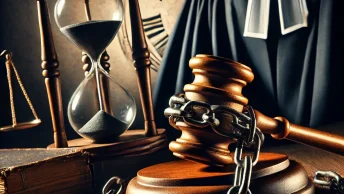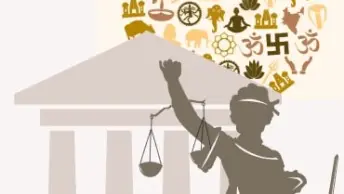William Broome, Race and Nationalism in Nehru’s India
Guest post by Douglas McDonald
In light of the recent passing of Benedict Anderson, this post reflects on the resonance of his work with the life and career of a remarkable Indian: William Broome, the last British judge to remain on an Indian High Court (serving on the Allahabad High Court until 1972), who came to India as an Indian Civil Service (ICS) officer, took Indian citizenship and assimilated to a remarkable degree into Indian life and society. (For more details about Broome, please see my article about him, ‘Becoming Indian’, in the Indian Historical Review.) This post briefly considers Broome, and the significance of Nehru’s insistence that Broome be permitted to become an Indian citizen, in light of Anderson’s seminal Imagined Communities.
Broome was not the only British judge to have remained in service in India after Independence,[1] nor even the only one among these judges to have displayed a lasting fascination with Indian law, history and culture. (Indeed, such an interest need not invariably be the product of any genuine love for independent India itself (outside the colonial project), but may merely be a manifestation of colonialism’s pursuit of ‘a totali[s]ing classifactory grid’ regarding its subjects.[2]) Broome was unique both through his actions after Independence (not only ‘staying on’, but forsaking his British nationality and taking Indian citizenship) and through his personal conduct even prior to the end of the Raj: marrying an Indian woman, raising his children as Hindus and immersing himself in Indian languages (including Urdu, Sanskrit, Bengali, Tamil and Malayalam) and culture. In supporting Broome’s efforts to seek Indian citizenship, Jawaharlal Nehru declared that ‘I have seldom known any Englishman who has so Indianized himself in various ways as he has’:
“He is…a good linguist in Indian languages. He has married an Indian wife. In fact, he is as much as Indian as anybody can be who is not borne in India and indeed probably more so than many people born in India.”[3]
Even in the final years of the Raj (in which a majority of serving ICS officers were of Indian descent), the governance of India was characterised by strict racial and cultural hierarchies – with even Anglicised local elites ‘barred from the uppermost peaks of the Raj’, forbidden (by virtue of the stark divide between the British ‘nation’ and the broader Empire governed by and for that nation) from governing themselves or Imperial realms outside India.[4] Broome, a ‘middle-class metropolitan’[5] (English-born, educated at English schools and Cambridge, admitted to Lincoln’s Inn), enjoyed privileges under the Raj that Anglicised Indian subjects (or even Anglo-Indians) could never attain. (These barriers arose because of racial prejudice[6] and because, again, of the ‘discrepancy between nation and dynastic realm’,[7] and the imperatives of marshalling popular support in the emerging ‘nation’/metropole behind the Imperial project and its rulers.[8] This task would have been impossible had Britain, or England, itself been perceived as being at risk of rule by colonised subjects.) It is in this context of (to some extent inflexible and unyielding) hierarchy that Broome’s initial attempts to adopt and absorb certain aspects of Indian cultural identity, and his subsequent literal renunciation of British nationality (a necessary precondition to taking Indian citizenship), gain such significance.
Broome’s decision to seek Indian citizenship, and the nation’s willingness to accept his fealty and continued service (indeed, the decision of the serving Prime Minister to intervene on his behalf), illuminates interesting aspects of ‘citizenship’ and ‘nationalism’ in the young Indian republic. Even given India’s substantial racial and religious diversity, it is significant that the imagined ‘India’ of the 1950s was perceived as being so potentially broad in its scope as to encompass even nationals of the former occupying power. Nehru’s vision of the ‘Indian’ civic community was not defined even in terms of place of birth (much less race or religion) or by virtue of consistent, unflagging support for the Indian national project. Although Broome was by no means the only British national to reside in India after Independence,[9] the novelty of his circumstances is demonstrated by the fact that Broome’s desire for Indian citizenship exposed an awkward omission in Indian citizenship laws at the time – that Broome could not immediately transfer from British to Indian citizenship (losing the former in the process), but was required to first renounce his British nationality before progressing (from a brief interval of statelessness) to Indian nationality.[10] The fact that this lacuna existed (at the time) is less important as a marker of contemporary political attitudes than the efforts taken by Nehru to barrack for Broome’s claims and to assert his right to Indian nationality should he so choose.[11]
Admittedly, Nehru (and India’s) willingness to accept Broome as a citizen does not demonstrate a wholly ‘political’ conception of citizenship – as Nehru’s testimony (extracted above) to Broome’s ‘Indianisation’ demonstrates. (Interestingly, Broome’s efforts to raise his children as Hindus did not extend to his own creed; Broome, like Nehru, was not personally religious.) However, even the extent of Nehru’s indifference to Broome’s personal history (as an Englishman and ICS officer) attests to Chatterjee’s notion that the ‘dominant elements of [Indian nationalism’s] self-definition’ (distinguishing itself from the prior order’s ‘rule of colonial difference’) were drawn from liberal-democratic ideology (regardless, for the moment, of the contradictions inherent in how these applied in practice).[12] This bears upon the extent (and potential boundaries) of the prospective Indian community – where the ‘deep, horizontal comradeship’ inherent in the national community[13] may exist on the level of shared affinity for a present political dispensation (that is, the contemporary nation-state itself) rather than solely by reference to antiquity of residence in a particular place, or resulting cultural, religious or linguistic heritage (that is, departing from traditional principles of ‘collective belonging’ in other nations). Broome serves as an illustration (at the outlying edge) of this principle, applied to differing degrees throughout the Indian national project (and its toleration and accommodation of difference) – what Varshney describes as a nationalism defined in terms of ‘a common future or a common purpose’, as distinct from ‘a common past or from common origins’.[14] His life hence exemplifies a certain strand of Nehruvian ideology.
Ideals of universalism, tolerance and religious pluralism are currently under attack – in the Middle East, in India, in Europe and in the United States. The notion that a national community can transcend religious, linguistic and racial divides (and can instead derive from shared commitment to that nation) faces rhetorical scorn from conservative politicians and pundits and violent reprisals from an intolerant fringe. At this historical moment, there is value in acknowledging that nations are not fixed, ahistorical constructs, and ethno-sectarian models of community are not an inevitable or uncontested model; there are other viable (even admirable) sources around which such communities may be imagined and constructed. Broome’s life demonstrates that the Indian national community can be broad enough, and inclusive enough, to transcend even the divide that the Empire attempted to construct between coloniser and colonised; his own life, and the intellectual climate that accommodated him, demonstrates the possibility of an ‘alternative modernity’, a spirit of tolerance and respect drawing upon both ‘western modern and indigenous traditional cultural systems’.[15] This inclusive spirit (extending at one reach to encompass the inclusion of Broome within the Indian nation, but also allowing the national community to transcend other divides of race, culture and religion) must be defended and preserved.
Douglas McDonald previously worked as a solicitor with Craddock Murray Neumann Lawyers, Sydney. He is grateful to the editors of Law and Other Things for the opportunity to publish this post.
[1] A full list of these judges is provided in Appendix I of Becoming Indian.
[2] Benedict Anderson, Imagined Communities: Reflections on the Origin and Spread of Nationalism (revised ed, 2006) (“Imagined Communities”), p.184. The use of such classification as a means of control is further explored in the work of Bernard Cohn.
[3] Jawaharlal Nehru, ‘Grant of Indian Citizenship to William Broome’, Note to Secretary General, MEA and Finance Secretary, New Delhi, 30 March 1958.
[4] Imagined Communities, p.92.
[5] Ibid.
[6] With the status of Anglo-Indians, in particular, mirroring Anderson’s ‘irredeemabl[e]… creole[s]’ in the Spanish Americas, barred from vertical ascent or horizontal transfer within the Empire: ibid, p.58.
[7] Ibid, pp.60, 110.
[8] Ibid, p.111.
[9] See e.g. Ramachandra Guha, ‘The Other Side of the Raj’ in An Anthropologist Among the Marxists and Other Essays (2001), pp.126-137; Geoffrey Moorhouse, Calcutta (revised ed, 1998), pp.262-263.
[10] Jawaharlal Nehru, ‘Grant of Indian Citizenship to William Broome’, Note to Secretary General, MEA and Finance Secretary, New Delhi, 30 March 1958. For more details, read Becoming Indian.
[11] Ibid; Jawaharlal Nehru, ‘Citizenship for William Broome’, Note to Home Ministry, New Delhi, 16 May 1958.
[12] Partha Chatterjee, The Nation and its Fragments: Colonial and Postcolonial Histories (1993), p.10.
[13] Imagined Communities, p.7.
[14] Ashutosh Varshney, ‘Contested Meanings’ in Battles Half Won: India’s Improbable Democracy (2013), pp.105-107.
[15] Rajeev Bhargava, ‘Liberal, Secular Democracy, and Explanations of Hindu Nationalism’ in The Promise of India’s Secular Democracy (2010) p.259.






[…] As I have previously written, not all British judges left India after Independence; a small number of these judges ‘stayed on’, even remaining in service into the 1970s. Several British judges also remained in service in Pakistan after 1947. This blog post looks at the careers of several of these judges, and remarks briefly upon what their lives demonstrate about state formation in Pakistan. […]
[…] As noted in the title, this post is a brief biographical sketch of Sir Orby Howell Mootham, the second-last British Chief Justice of an Indian High Court and the third-last British judge to serve in India. (Only Donald Falshaw, Chief Justice of the Punjab High Court, and Wiliam Broome of the Allahabad High Court outlasted Mootham. I have previously written about Broome for this blog.) […]
[…] As I have previously noted, the fact that the Indian state made use of, and was willing to recognise as fellow nationals, some of the British who remained in India is a telling point of discontinuity: that from a history defined by racial intolerance and hierarchy and by imperial attempts at static classifications, the new Indian state chose to define itself neither by ignoring or eliminating difference but instead in conscious acknowledgment of the many national, cultural and religious histories of its peoples and by seeking to make use of their talents – including representatives of the former intolerant, classifying power itself. […]
Thanks for the good article.